AI agent platforms are totally changing how we interact with tech and do business these days. These smart systems can automate tasks, analyze data, and make decisions with barely any human intervention. As AI gets better and better, we’re seeing a bunch of new AI agent platforms pop up that let businesses and individuals use the power of these autonomous systems. Let’s check out the top AI agent platforms to watch in 2025 and see what they can do.
Table of Contents
What are AI Agents?
Ever played a video game with a character that gets smarter and adapts to how you play? Or a voice assistant that seems to read your mind and knows what to do without you spelling it out? That’s what we call AI agents! They’re like little computer programs with brains of their own. They learn from experience, make choices, and can even interact with the world around them. This makes them way cooler than other AI that just does one specific thing, like recognizing pictures or translating languages. AI agents are the future! They’re popping up everywhere, from helping out with customer service to lending a hand in super complex research projects.

Research Methodology
Here’s how we got the info for this article:
- Found the Top Platforms: We looked around and picked out the most popular and useful AI agent platforms that are making waves in the industry.
- Got the Platform Info: We dug up details on what each platform can do, its features, and how people use them. We used trustworthy sources like official websites, documentation, and industry reports.
- Checked Out the Companies: We did some digging on the companies behind these platforms, finding out about their funding, team, and goals. This helps understand where they’re coming from and where they’re going.
- Read User Reviews: We checked out reviews and comparisons from users and experts to see what they liked and didn’t like about each platform, and how they’re using them in real life.
- Kept Up with Trends: We researched what’s hot now and what’s predicted for the future of AI agent platforms to give you the full picture of how things are changing.
Top AI Agent Platforms
Here’s a closer look at some of the leading AI agent platforms:
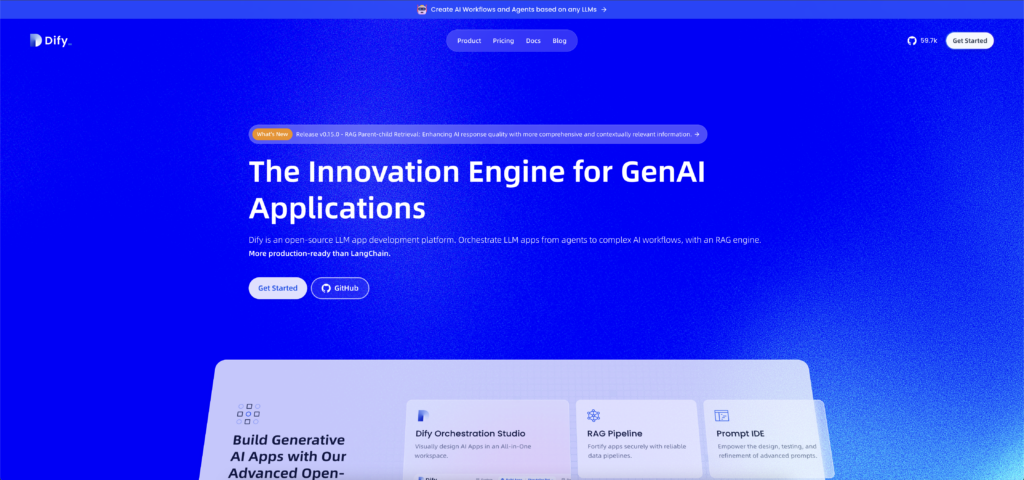
Dify
Dify is an awesome open-source platform that makes building AI apps with large language models (LLMs) super easy. It has tools for visual prompt orchestration, retrieval-augmented generation (RAG) pipelines, agent capabilities, model management, and observability features. Dify supports a bunch of different LLMs, both proprietary and open-source, so developers can build, test, and deploy AI workflows quickly. With its easy-to-use interface, Dify makes it a breeze to prototype and deploy generative AI applications quickly.
Key Strengths:
- Rapid prototyping: Dify is great for rapid development because of its no-code/low-code platform.
- Ease of use: Its user-friendly interface makes it perfect for teams with mixed technical skills.
- Open source: Dify’s open-source nature encourages community collaboration and rapid iteration.
Differentiators:
- Comprehensive solution: Unlike other tools that only offer individual components, Dify provides a complete, production-ready solution.
- Model neutrality: Dify supports a wide range of LLMs, giving developers the freedom to choose the best model for their needs.
- Local deployment: Dify allows for full local deployment of services, giving users greater control over their data and applications.
Key Takeaways:
Dify is a user-friendly and comprehensive platform for building AI agents. Its no-code approach and support for various LLMs make it accessible to both developers and non-technical users. Dify’s focus on rapid prototyping and ease of use makes it a great choice for businesses looking to quickly develop and deploy AI agents.
Use Cases with Examples
- Startups: With Dify, startups can whip up MVPs that show off their AI-driven ideas. Think of it like this – a startup could build a chatbot for customer service that works with their current systems. This helps them test their business model before going all-in.
- Custom AI Solutions: Dify lets businesses build AI solutions that fit their specific needs. For example, a travel startup could use Dify to create an AI-powered travel assistant that helps users plan trips, book accommodations, and get real-time updates.
- Multi-language Translation: Need to translate content and make sure it sounds right? Dify can help create a multi-language translation agent that adapts content to the right tone and sentence structure for specific use cases.
- AI-Powered Travel Consultant: Dify can also build an AI travel consultant that can create travel plans, give info on local conditions and accommodations, and suggest local dining and lodging options.
Company Overview and Future Outlook
Launched in May 2023 by LangGenius, Inc., Dify.AI is all about building cool stuff with AI. In less than a year, over 130,000 AI apps were created on Dify’s cloud service, and it got 18.5k stars on GitHub – not bad at all! The company wants to help both developers and business folks use LLMs to make awesome new products.
Dify also provides features for auditing, logging, and monitoring, so users stay in control and can find success with their apps over the long haul. The platform is always looking for new tech to add, like agent mode and ChatGPT plugins, so users can create even more dynamic, interactive, and intelligent applications.
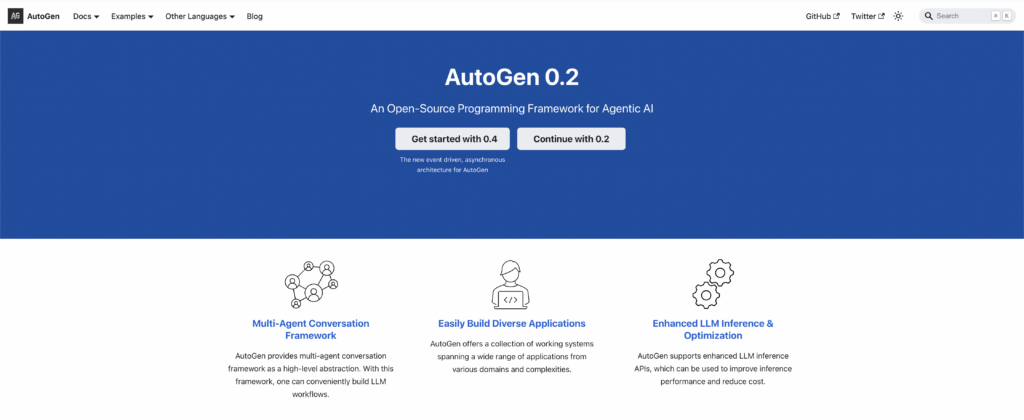
AutoGen
Microsoft Research’s AutoGen lets you build complex AI workflows using multi-agent conversations. It’s like a high-level blueprint for creating applications that use large language models (LLMs) and other AI tech. AutoGen makes it easier to develop LLM-powered applications and supports different LLM configurations, tool usage, and human-AI interaction.
Key Strengths:
- Multi-agent collaboration: AutoGen lets you create and manage multiple agents for fancy AI interactions.
- Code execution capabilities: AutoGen can generate, execute, and debug code as part of its problem-solving process.
- Flexible workflow orchestration: The framework lets you design complex workflows where multiple agents work together to tackle tough challenges.
Differentiators:
- Asynchronous messaging: Agents talk through asynchronous messages, supporting both event-driven and request/response interaction patterns.
- Modular and extensible: Users can easily customize systems with pluggable components, including custom agents, tools, memory, and models.
- Observability and debugging: Built-in tools provide tracking, tracing, and debugging agent interactions and workflows.
Key Takeaways:
AutoGen’s strength is its ability to handle complex multi-agent interactions and its smooth integration of code execution within AI workflows. This makes it a powerful tool for tasks that need sophisticated reasoning, automation, and problem-solving skills.
Use Cases with Examples
- Software Development: AutoGen can help you automate stuff like writing code, running it, and getting rid of those pesky bugs, making the whole software development process a breeze.
- Data Analysis: Need to crunch some numbers and make them look pretty? AutoGen can create agents to analyze your data, create visualizations, and give you the insights you need.
- Automated Task Solving: AutoGen can create agents to take care of those complex tasks you don’t have time for, like managing your investments or even designing t-shirts.
- Research and Innovation: AutoGen can also be your research assistant, helping you gather information, summarize your findings, and generate reports.
Company Overview and Future Outlook
AutoGen, an open-source project by Microsoft Research, is all about making AI agents better and faster. Microsoft’s really into this whole AI agent thing, and AutoGen is a big part of that. People are excited about AutoGen because it could totally change how we work and solve real-world problems using AI agents and multi-agent applications.
AutoGen is always getting updated to be bigger, better, and stronger. They’re even working on making it so agents built in different programming languages can work together and adding full type support to make the code even better.
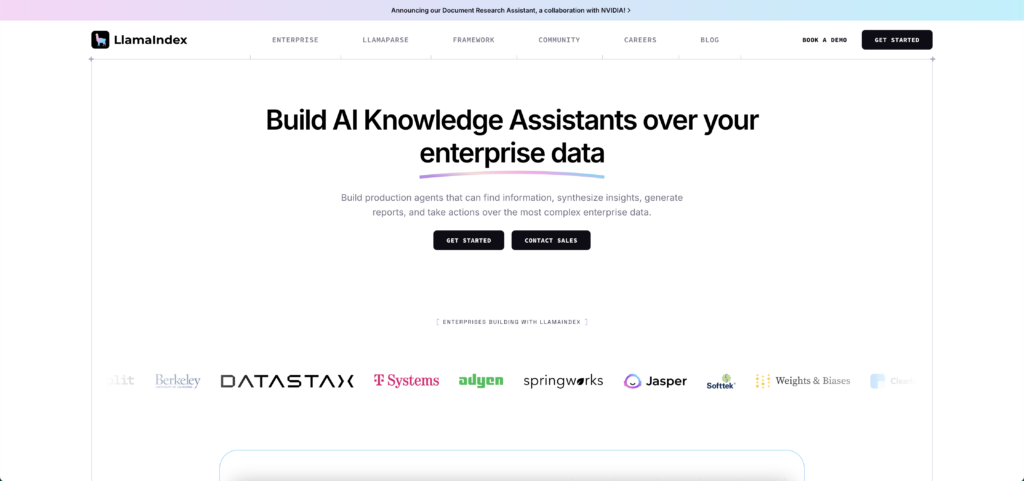
LlamaIndex
LlamaIndex is a data framework that makes it easy to add large language models (LLMs) to your applications. It’s all about connecting LLMs to different data sources (both structured and unstructured) so they can answer questions and reason things out. LlamaIndex is especially good at retrieval augmented generation (RAG), which means LLMs can access and use external data to give you better answers.
Key Strengths:
- Data integration: LlamaIndex is awesome at handling many different data sources, so it’s perfect for projects that need strong data integration.
- Advanced retrieval algorithms: LlamaIndex has advanced and optimized retrieval algorithms that make data access super efficient.
- User-friendly interface: LlamaIndex has a simple and user-friendly interface for managing data and building AI applications.
Differentiators:
- Focus on data: LlamaIndex specializes in data ingestion, indexing, and retrieval, making it a powerful tool for data-centric workflows.
- LlamaHub: LlamaHub extends LlamaIndex’s capabilities with a huge library of data loaders for seamless integration with various data sources.
- Query engines: LlamaIndex offers a variety of query engines to optimize data retrieval for different use cases.
Key Takeaways:
LlamaIndex’s primary focus on data integration and retrieval makes it a valuable tool for building AI applications that need access to and analysis of diverse data sources. Its advanced retrieval algorithms and user-friendly interface simplify the process of connecting LLMs with external data, enabling the development of more context-aware and data-driven AI applications.
Use Cases with Examples
- Agentic RAG: Want a context-augmented research assistant that can tackle those complex research tasks? LlamaIndex can help with that!
- Report Generation: Need to generate multimodal reports? LlamaIndex’s multi-agent researcher and writer workflow can get it done.
- Customer Support: Building a multi-agent concierge to handle customer inquiries and provide support? LlamaIndex has you covered.
- Content Curation: LlamaIndex can also build AI agents that suggest personalized content and summarize information for users.
Company Overview and Future Outlook
LlamaIndex, which started in March 2023, is a data framework for LLMs that helps developers connect their AI models to different data sources. The company got $8.5 million in seed funding led by Greylock to build an enterprise offering on top of its popular open-source project. LlamaIndex’s goal is to unlock the full potential and use cases of any LLM for both individuals and companies.
LlamaIndex is actively working on new features and functionalities to make its platform even better. These include agentic document workflows, support for NVIDIA NIM microservices, and LlamaReport, a tool for transforming documents into structured reports. The company is also focused on expanding its ecosystem and partnerships to further its mission of making LLM applications more accessible and powerful.
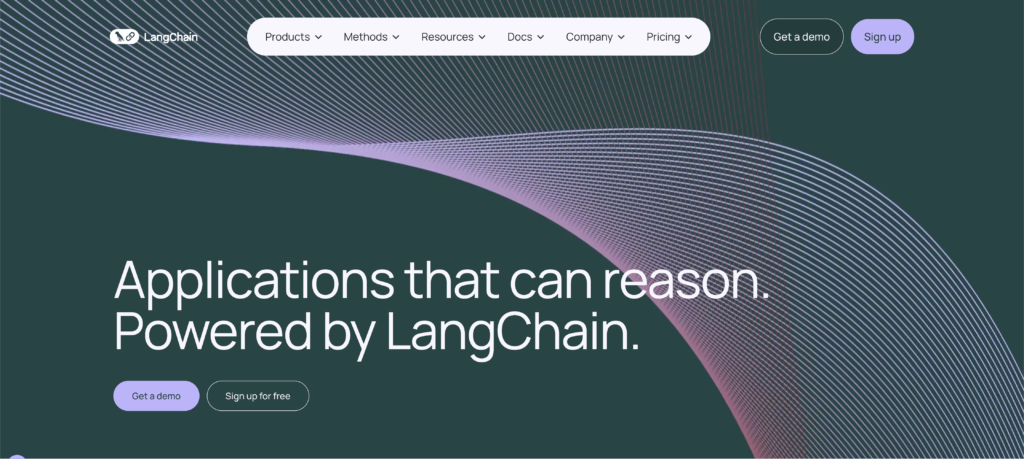
LangChain
LangChain is an open-source framework that helps you build applications powered by large language models (LLMs). It gives you a bunch of tools and abstractions to make it easier to develop, deploy, and manage those complex AI applications. Think of it like building blocks – LangChain lets you create “chains” that connect LLMs with other stuff, like prompt templates, other LLMs, and external data sources.
Key Strengths:
- Comprehensive framework: LangChain gives you everything you need to build LLM applications, including chains, agents, and prompt templates.
- Extensive integrations: LangChain plays well with tons of other tools and services, so you can easily connect your AI applications with them.
- Scalability: LangChain works for both simple and complex systems, so it’s a good choice no matter the size of your project.
What Makes it Different:
- Agent framework: LangChain’s agent framework lets you create AI systems that can think, make decisions, and do tasks on their own.
- Memory capabilities: LangChain is great at remembering past conversations and keeping things in context, which is important for AI.
- Robust ecosystem: LangChain has a strong ecosystem, with tools like LangGraph for workflow orchestration and LangSmith for evaluation and monitoring.
Key Takeaways:
LangChain is a versatile tool for building all sorts of LLM-powered applications, thanks to its comprehensive framework and extensive integrations. Its agent framework and memory capabilities are especially useful for creating conversational AI systems and applications that need context awareness and complex reasoning.
Use Cases with Examples
- Customer Support: LangChain can be used to build AI-powered customer support systems that can handle inquiries, troubleshoot issues, and escalate complex problems to human agents when necessary30.
- Content Creation: LangChain can assist in generating high-quality content for blogs, social media, and marketing campaigns30.
- Data Analysis: LangChain agents can automate data extraction and analysis tasks, providing valuable insights30.
- Personal Assistants: LangChain can be used to build AI-powered personal assistants that can manage schedules, automate tasks, and provide information30.
- Summarization: LangChain can be used to summarize various types of text, including articles, transcripts, and financial documents31.
Company Overview and Future Outlook
LangChain, which started in January 2023, is an open-source framework used to build LLM applications. The company got a whopping $35 million in funding from big-shot investors like Benchmark and Sequoia Capital. LangChain’s goal is to simplify building LLM apps, so developers can go from idea to actual working code in no time.
LangChain is constantly working on new stuff to make its platform even better and support the growing AI agent ecosystem. This includes LangGraph Cloud, which is like a superhighway for running agents on a massive scale, and LangSmith, a tool that helps with debugging, teamwork, and keeping an eye on LLM applications. The company is also focused on growing its community and partnerships to make LLM app development easier and more efficient for everyone.
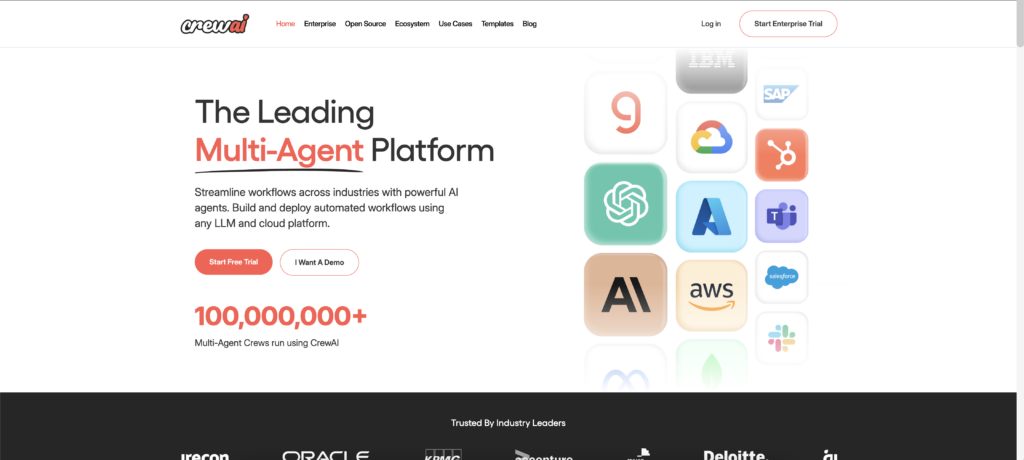
CrewAI
CrewAI is an open-source Python framework that helps you build and manage teams of AI agents35. It’s all about giving each AI agent a specific job, letting them make their own decisions, and helping them talk to each other36. This way, they can work together to solve tricky problems that would be too much for just one AI agent36.
Key Strengths:
- Multi-agent AI systems: CrewAI lets multiple AI agents team up, share what they know, and work together towards a shared goal35.
- Task management: CrewAI makes sure every agent knows its part in getting things done36.
- Flexible communication: CrewAI supports different ways for agents to talk to each other, so they can share information easily36.
What Makes It Different:
- Role-based architecture: With CrewAI, you can give each agent a specific role, which defines what they can do and what they’re allowed to do36.
- Tool integration: CrewAI lets agents interact with the world using different tools. This means they can search the web, understand language, analyze data, and do custom tasks36.
- Scalability: CrewAI is built to handle growth easily, so your multi-agent system stays fast and responsive even as it gets bigger36.
Key Takeaways:
CrewAI is great because it helps multiple AI agents work together and get things done. By giving them roles and making it easy for them to communicate, CrewAI lets developers build AI systems that can tackle tough problems way better than AI agents working alone.
Use Cases with Examples
- Travel Agencies: Need to create custom travel packages? CrewAI can help with that.
- User Simulation: Want to simulate users and get feedback at scale? CrewAI has your back.
- Internal Automations: CrewAI can handle internal automations, like researching and creating reports on competitor products and their pricing.
- Content Creation: Need to automate content creation around marketing at scale? CrewAI can do it.
- Lead Qualification: CrewAI can automate lead qualification and outreach.
Company Overview and Future Outlook
CrewAI, which started in 2022, is a major platform for multiple agents. They’ve gotten a ton of money, $18 million, from investors like boldstart ventures and Insight Partners38. Their open-source platform runs over 10 million agents every month and is used by almost half of the Fortune 500 companies38. CrewAI’s goal is to make it super easy and quick to develop both simple and complex multi-agent AI workflows38.
CrewAI is always working on new features and functions to make their platform even better and support the growing AI agent world39. This includes native multimodal support, better integrations for enterprise systems, and tools to let agents work together autonomously across different platforms40. The company is focused on building solutions that are not only advanced but also practical and ready for production40.
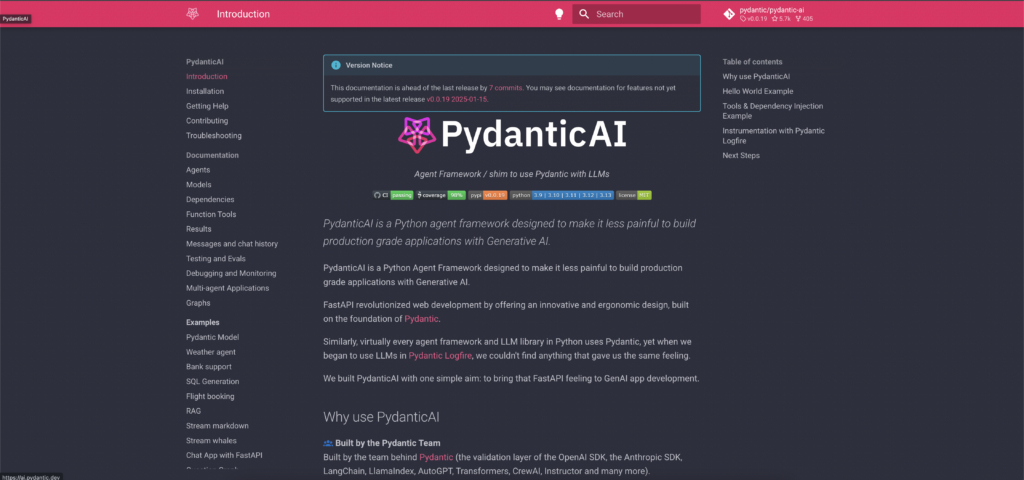
Pydantic AI
Pydantic AI is a Python agent framework that makes it way easier to build production-ready applications with Generative AI. It uses Pydantic’s data validation and works seamlessly with LLMs, ensuring structured, type-safe, and secure interactions.
Key Strengths:
- Type-safe validation: Pydantic AI makes sure that all responses match the expected structures, providing strong type safety.
- Native Python support: Pydantic AI lets developers write application logic using plain Python, making it easy to learn.
- Structured responses: Pydantic AI uses Pydantic to validate and structure model outputs, ensuring responses are consistent across runs
Differentiators:
- Model-agnostic: Pydantic AI supports OpenAI, Anthropic, Gemini, Ollama, Groq, and Mistral, and it’s easy to add support for other models
- Dependency injection system: Pydantic AI has an optional dependency injection system to provide data and services to your agent’s system prompts, tools, and result validators
- Streamed responses: Pydantic AI provides the ability to stream LLM outputs continuously, with immediate validation
Key Takeaways:
Pydantic AI’s focus on type safety and structured outputs makes it a solid and reliable framework for building production-ready AI agent applications. Its native Python support and model-agnostic design make it flexible and easy to use for developers.
Use Cases with Examples
- Structured Orchestration: Pydantic AI can be used to build agents that can handle complex tasks with LLMs, making sure that the inputs and outputs for each step are valid.
- Reusability: With Pydantic AI, developers can define specialized agents for tasks like summarization, data extraction, and code generation with clear contracts, making them reusable and modular.
- Support Systems: Pydantic AI can also be used to build support systems that provide structured and validated responses to user inquiries.
Company Overview and Future Outlook
Pydantic AI is being developed by the same team that created Pydantic, a popular Python library used for data validation and parsing. Pydantic is widely used in the Python community, even in AI/ML projects and frameworks like LangChain and LlamaIndex. The company wants to bring the same ease of use and great developer experience to the world of generative AI application development.
Pydantic AI is still in active development, with plans for future improvements and integrations. The team is working on expanding the framework’s capabilities and making it work better with other tools and services in the AI ecosystem.

Wordware AI
Wordware AI is a platform for building AI agents that lets you iterate quickly using natural language programming47. It mixes the best parts of software development with the power of natural language, so both techies and non-techies can work together to create AI solutions47.
Key Strengths:
- Natural language programming: Wordware AI lets you create AI agents using plain English, making it easy for anyone to use47.
- Multimodal support: Wordware AI supports multimodal AI workflows, allowing you to mix text, images, audio, and video into your AI agents48.
- One-click API deployment: Wordware AI makes deployment simple with one-click API deployment, making it easy to get AI agents up and running quickly47.
Differentiators:
- Web-hosted IDE: Wordware AI gives you a web-hosted IDE that makes collaboration easy and simplifies development47.
- Version control: Wordware AI includes version control features, allowing developers to track changes and manage different versions of their AI agents47.
- Focus on developer experience: Wordware AI prioritizes developer experience, providing an intuitive interface and well-documented API48.
Key Takeaways:
Wordware AI’s unique approach to AI agent development, using natural language programming and multimodal support, makes it a powerful tool for both technical and non-technical users. Its focus on developer experience and rapid deployment simplifies the process of building and deploying AI agents, making it an attractive option for businesses looking to quickly implement AI solutions.
Use Cases with Examples
- Smooth AI Workflows: Wordware AI can make AI workflows easier for businesses by taking care of tasks and making operations better.
- Customer Service Chatbots: Wordware AI can build customer service chatbots to handle questions and provide support.
- Healthcare AI Assistants: Wordware AI can develop healthcare AI assistants to help with things like medical scribing and talking to patients.
- Financial Analysis Tools: Wordware AI can create financial analysis tools that analyze data, make reports, and give insights.
- Content Automation: Wordware AI can automate content generation for different things like marketing and social media.
Company Overview and Future Outlook
Wordware AI, which started in 2021, is an AI development platform that wants to make AI development easy for everyone. They got $30 million in funding from Spark Capital to build the ultimate operating system for AI development. Wordware AI’s goal is to totally change how the world builds with AI.
Wordware AI is busy adding new features and functions to improve its platform and support the growing AI agent ecosystem. This includes advancements in natural language processing, better collaboration through multi-agent systems, and the development of emotional intelligence in AI agents. The company is focused on redefining how AI solutions are built and used, making AI development easier and more powerful for everyone.
Other Notable Platforms
So, we’ve talked about some of the big names in AI agents, but there are a few other platforms you might want to check out!
- Bizway: This one’s great if you don’t know how to code 52. It has a super easy-to-use interface that lets you automate tasks, manage your business data, and scale things up without any hassle 52.
- Relevance AI: This one’s got a whole bunch of tools for building powerful AI agents 53, and it’s perfect for businesses that need lots of integrations 53. You can use it to create AI agents that can take care of all sorts of tasks and workflows 53.
- Lindy AI: This one lets you build AI agents in minutes – no coding required 54! It’s great for boosting productivity and automating tasks 54, and it works really well for things like customer support and medical scribing 54.
- Google Cloud AI: This one’s all about advanced AI and data integration 55. It has tons of tools and APIs that you can use to build and deploy AI solutions 55.
- IBM Watson: This one’s been around for a while, and it’s really good at natural language processing, machine learning, and data analysis 55. It has a whole suite of AI tools and APIs that are designed for specific industries 55.
- Relay.app: This one has a ton of app integrations and automation features 55. It gives you in-context AI help to make all sorts of business tasks easier 56, and it lets you create complex workflows without breaking a sweat 56.
AI Agents on GitHub and Open Source
GitHub is a great place for AI agent development, with tons of repositories dedicated to open-source projects and frameworks. These projects show how collaborative the AI community is and give developers and researchers awesome resources.
Some cool examples of AI agent repositories on GitHub include:
- AutoGen: An open-source framework by Microsoft for building next-gen LLM applications.
- AgentScope: A framework for building LLM-empowered multi-agent applications.
- CrewAI: A cutting-edge framework for orchestrating role-playing, autonomous AI agents.
- MegaGPT: A framework for building AI agents with a focus on natural language programming.
- OpenHands: A platform for software development agents powered by AI.
These open-source projects are pushing AI agent development forward and making these technologies available to way more people.
Current Trends and Future Outlook
The AI agent world is changing fast and here are some of the hot trends we can expect:
- AI agents everywhere: Businesses are realizing the power of AI agents to automate tasks, boost productivity, and make smarter decisions, so they’re using them more and more. This could change the job market, with some jobs disappearing and new ones appearing in AI.
- AI that takes initiative: AI agents are getting better at predicting what we need and doing things without being told. This means they’ll fit into our lives and work more smoothly, giving us a more personalized experience.
- Super personalized experiences: AI agents will create experiences and services that are tailored to each person. This could change customer service completely – imagine AI agents that know what you like and give you personal recommendations and support.
- AI with feelings: AI agents are being developed with emotional intelligence, so they can understand and respond to human emotions. This could lead to friendlier and more human-like interactions with AI, making them better at jobs that need social skills.
- AI that uses all kinds of data: AI agents are becoming multimodal, which means they can process and interact with text, images, and audio. This means AI can interact with the world in more complex and smart ways, leading to more uses for it.
- Super smart multi-agent systems: Multi-agent systems are getting more sophisticated. This means AI systems can work together to solve complex problems by coordinating the actions of many specialized AI agents.
- Easy AI building tools: AI agent building frameworks are making AI agents easier for everyone to use, opening up new possibilities. This could lead to a ton of innovation and new uses for AI in all sorts of fields.
- AI and your devices: AI agents will work seamlessly with your smart home devices and personal gadgets, making everything talk to each other and automate more tasks. This could lead to smarter homes, offices, and cities, with AI agents running the show.
- Ethical AI: People are focusing more on making sure AI is used responsibly and ethically. This is super important to avoid bias and make sure AI is used for good.
- Better communication tools for AI: AI agents will have better communication and collaboration tools, so they can interact more effectively with us and other agents. This will make it easier for AI agents to work with human teams.
Conclusion
AI agent platforms are changing the way we interact with technology and do business. As things keep changing, we can expect to see even more impressive and powerful AI agents that can automate tasks, analyze data, and make decisions with increasing independence and efficiency. The platforms mentioned in this article are at the forefront of this technological revolution and show us what the future of AI-powered automation and intelligent systems might look like.
The big trends in AI agent platforms point toward more people using them, them being more proactive, super personalized, emotionally intelligent, and having multimodal capabilities. These trends have the potential to significantly change many parts of our lives, from customer experiences to jobs. As AI agents get more sophisticated and become part of our everyday lives, it’s important to think about ethics and make sure these technologies are developed and used responsibly.
For businesses and people looking to use AI agent technology, it’s key to carefully check out the different platforms and pick the one that best fits their needs and goals. Things to consider include how easy it is to use, scalability, integration capabilities, and the specific things offered by each platform. By understanding what these platforms can do and how they’re different, businesses and people can discover new possibilities and use the power of AI agents to reach their goals.



